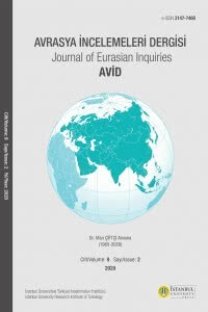THE MAKING OF SOVIET MIDDLE EAST POLICY VIS-À-VIS THE ARAB-ISRAELI CONFLICT BETWEEN JUNE AND OCTOBER WARS (1967-1973)
AbstractThe Soviet Union started to penetrate the Middle East in the second half of 1950's. Moscow's attempts to take advantage of anti-imperialist, nationalist, quasi-socialist Arab regimes reinforced its influence in the region. Cautious Soviet policy of avoiding involvement in the Arab-Israeli conflict and balanced Soviet relations towards revolutionary Arab states and Israel came to an end with the June War. The aftermath of the war necessitated Moscow to revise its Middle Eastern policy vis-Ã -vis the Arab-Israeli conflict. In this paper, I make an attempt to examine the making of the Soviet Middle East policy vis-Ã -vis the Arab-Israeli conflict between the June and October wars. My main argument is that Soviets were driven by promoting their interests in developing their foreign policy towards the Arab-Israeli conflict and took advantage of regional openings so as to preserve those interests. I also argue that the Soviet Union ended up being a part of the Arab-Israeli conflict as a result of its policies in interwar period.Keywords: Soviet Union, Arab-Israeli Conflict, June War, October War, Soviet Foreign Policy. ÖzetHaziran ve Ekim Savaşları Arasında Arap-İsrail Çatışması Bağlamında SovyetOrta Doğu Siyasetinin Oluşumu (1967-1973)Sovyetler Birliği 1950'li yılların ikinci yarısında Ortadoğu'ya nüfuz etmeyebaşladı. Moskova'nın anti-emperyalist, milliyetçi, yarı-sosyalist Arap rejimlerininmevcudiyetinden faydalanma çabaları, bölgedeki nüfuzunu pekiştirdi. Arap-İsrailçatışmasına müdahil olmaktan kaçınan temkinli Sovyet politikası ve Moskova'nındevrimci Arap rejimleri ile İsrail'e yönelik dengeli ilişkileri Altı Gün Savaşı ile sonaerdi. Savaşın sonuçları, Moskova'nın Arap-İsrail çatışması bağlamında Ortadoğusiyasetini gözden geçirmesini kaçınılmaz kıldı. Bu makalede, Altı Gün Savaşı ile YomKippur savaşı arasında Arap-İsrail çatışması bağlamında Sovyet Ortadoğu siyasetininoluşumu incelenecektir. Sovyetler Birliği'nin Arap-İsrail çatışmasına yönelik dışpolitika yapımında başat belirleyicinin milli menfaatleri olduğu ve menfaatlerinimuhafaza etmek adına bölgesel fırsatları değerlendirdiği ileri sürülmektedir. Ayrıca,Sovyetler Birliği'nin bu iki savaş arası dönemdeki politikalarının bir sonucu olarakArap-İsrail çatışmasında taraf haline geldiği savunulmaktadır.Anahtar Kelimeler: Sovyetler Birliği, Arap-İsrail Çatışması, Altı Gün Savaşı,Yom Kippur Savaşı, Sovyet Dış Politikası.
The Soviet Union started to penetrate the Middle East in the second half of 1950’s. Moscow’s attempts to take advantage of anti-imperialist, nationalist, quasisocialist Arab regimes reinforced its influence in the region. Cautious Soviet policy of avoiding involvement in the Arab-Israeli conflict and balanced Soviet relations towards revolutionary Arab states and Israel came to an end with the June War. The aftermath of the war necessitated Moscow to revise its Middle Eastern policy vis-à-vis the ArabIsraeli conflict. In this paper, I make an attempt to examine the making of the Soviet Middle East policy vis-à-vis the Arab-Israeli conflict between the June and October wars. My main argument is that Soviets were driven by promoting their interests in developing their foreign policy towards the Arab-Israeli conflict and took advantage of regional openings so as to preserve those interests. I also argue that the Soviet Union ended up being a part of the Arab-Israeli conflict as a result of its policies in interwar period.
___
• ABDEL NASSER, Gamal, The Philosophy of the Revolution, Cairo 19 • BEHBEHANI, Hashim, The Soviet Union and Arab Nationalism, London 1986.• CAMPBELL, John, “The Soviet Union and the United States in the Middle East”, The Annals of the American Academy of Political and Social Science, Vol. 401 (1972).
• CAMPBELL, John, “The Soviet Union in the Middle East”, Middle East Journal, Vol. 32 (1978).
• FORSYTHE, David P., “the Soviets and the Arab-Israeli Conflict”, World Affairs, Vol. 134 (1971).
• FREEDMAN, Robert, Israel’s First 50 Years, Gainesville 2000.
• GOLAN, Galia, “The Soviet Union and the PLO”, The Palestinians and the Middle East Conflict, (ed. G. Ben Dor), Tel Aviv 1978.
• GOLAN, Galia, Soviet Policies in the Middle East, Cambridge 1990. • HERRMANN, Richard, “Soviet Policy and the Arab-Israeli Conflict: Actions, Patterns, and Interpretations”, Political Science Quarterly, Vol: 102 (1987).
• KHALIDI, Rashid, Sowing Crises, Boston 2009.
• KHOURY, Fred, The Arab Israeli Dilemma, New York 1885.
• KORNIYENKO, Georgy, “Soviet Policy in the Middle East”’, Russia’s Muslim Frontiers, (ed. D. Eickelman), Indianapolis 1993. • KRAMMER, Arnold, “Soviet Motives in the Partition of Palestine”, Journal of Palestine Studies, Vol. 2 (1973).
• KREUTZ, Andrej, “Russian-Palestinian Relations: A Historical and Political Analysis”, Journal of Military and Strategic Studies, Vol.6 (2004).
• KREUTZ, Andrej, Russia in the Middle East: Friend or Foe? Connecticut 2007.
• LAQUEUR, Walter, “Russia Enters the Middle East”, Foreign Affairs, Vol. 47 (1969).
• LENCZOWSKI, George, Soviet Advances in the Middle East, Washington 1974.
• MAHMOOD, Mahrez, Soviet Policy towards the Arab-Israeli Conflict 1948-1988, New Delhi 1989.
• MORGENTHAU, Hans, Politics Among Nations, New York 1993.
• OREN, Michael, Six Days of War, Oxford 2002.
• PRIMAKOV, Yevgeni, Politikanın Mayınlı Tarlası, Istanbul 2008.
• PRIMAKOV, Yevgeni, Rusların Gözüyle Ortadoğu, Istanbul 2009. • PRIMAKOV, Yevgeni, Rusyasız Dünya, Istanbul 2010.
• ROI, Yaacov, “Soviet Policy in the Middle East”, Cahiers du monde Russe et Soviétique, Vol. 15 (1974).
• RUBINSTEIN, Alvin, “The Middle East in Russia’s Strategic Prism”, Diplomacy in the Middle East (ed. Carl Brown), London 2004.
• SLATER, Jerome, “The Superpowers and an Arab-Israeli Political Settlement”, Political Science Quarterly, Vol. 105 (1990-1991).
• YEMELİANOVA, Galina, “Russia and Islam: the History and Prospects of a Relationship”, Asian Affairs, Vol. 26 (1995).
• YODFAT, Aryeh and ARNON-OHANNA, Yuval, PLO Strategy and Tactics, London 1981.
- Yayın Aralığı: Yılda 2 Sayı
- Başlangıç: 2012
- Yayıncı: İstanbul Üniversitesi
Sayıdaki Diğer Makaleler
RUSSIA'S CENTRAL ASIA POLICY UNDER BORIS YELTSIN
RUSYA FEDERASYONU'NDA DİN EĞİTİMİ MESELESİ
PRAGMATIC FRIENDSHIP IN THE UK-TURKEY RELATIONS
Alexandra KONONOVA, Alexander KORNİLOV
BATI SORUNU ÇERÇEVESİNDE DOSTOYEVSKİ'DE TÜRK VE DOĞU ALGISI
POLONYALI HOTEL LAMBERT VE BÜYÜK SIRBİSTAN “NAÄŒERTANIJE” PLANI (1840-1844)
“DÜZENLEME OKULU”NUN PERSPEKTİFİNDEN “ÇİN'İN EKONOMİ-POLİTİĞİNE” VE “KÜLTÜREL YAPISI”NA BAKMAK
